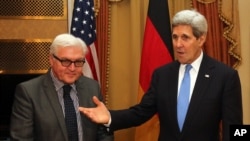U.S. Secretary of State John Kerry says that though negotiators are making "careful progress" in talks on the future of Iran’s nuclear program, "some serious gaps" remain.
It was Kerry’s first comment on the talks since arriving Thursday in Vienna, amid indications that the closely held process was advancing.
"We've been obviously having difficult talks here [on a] complicated topic," said Kerry. "We're working hard. We hope we're making careful progress, but we have big gaps. We still have some serious gaps, which we're working to close."
Kerry met again with his Iranian counterpart, Mohammed Javad Zarif.
The top U.S. envoy spent part of Saturday in telephone meetings.
He spoke with Israeli Prime Minister Benjamin Netanyahu about the ongoing negotiations, according to a State Department spokesperson.
He spoke with foreign ministers from the Persian Gulf countries of Qatar, Kuwait, Bahrain and the United Arab Emirates. There is considerable skepticism in the Gulf about the value of a nuclear deal with Iran, and concern about the impact of potentially better U.S.-Iran relations.
'Hours of truth'
Kerry spoke to the Turkish, French and Canadian foreign ministers. He also met with German Foreign Minister Frank-Walter Steinmeier, who called the remaining time before the midnight Monday deadline "the hours of truth" regarding Iran’s intentions.
"The main question is if Iran is really ready to renounce every research development working in the direction of getting nuclear weapons," Steinmeier said. "That is the only criterion."
Iran has officially renounced nuclear weapons, but the negotiators from six nations representing the U.N. Security Council want verifiable guarantees, including a sharp reduction in Iran’s nuclear enrichment capacity and intrusive inspections. Iran wants more capability and a rapid end to international economic sanctions that have crippled its economy.
Iranians ready for economic relief
Iranian-American activist and author Titra Parsi said that is more than just a negotiating point to the delegation sent by reformist Iranian President Hassan Rouhani.
"If the deal provides them with tangible, immediate economic relief, then that’s going to be very popular with the public, and that’s going to make it more difficult for the critics of the Rouhani government to shoot it down," Parsi said.
Russia's foreign minister, Sergei Lavrov, is expected here Sunday. Other European ministers may also rejoin the talks as the deadline approaches.
Analysts are divided on whether a deal is possible by Monday night, but if not, they expect agreement on an extension to enable what Kerry calls the "difficult" and "serious" diplomacy to continue.




